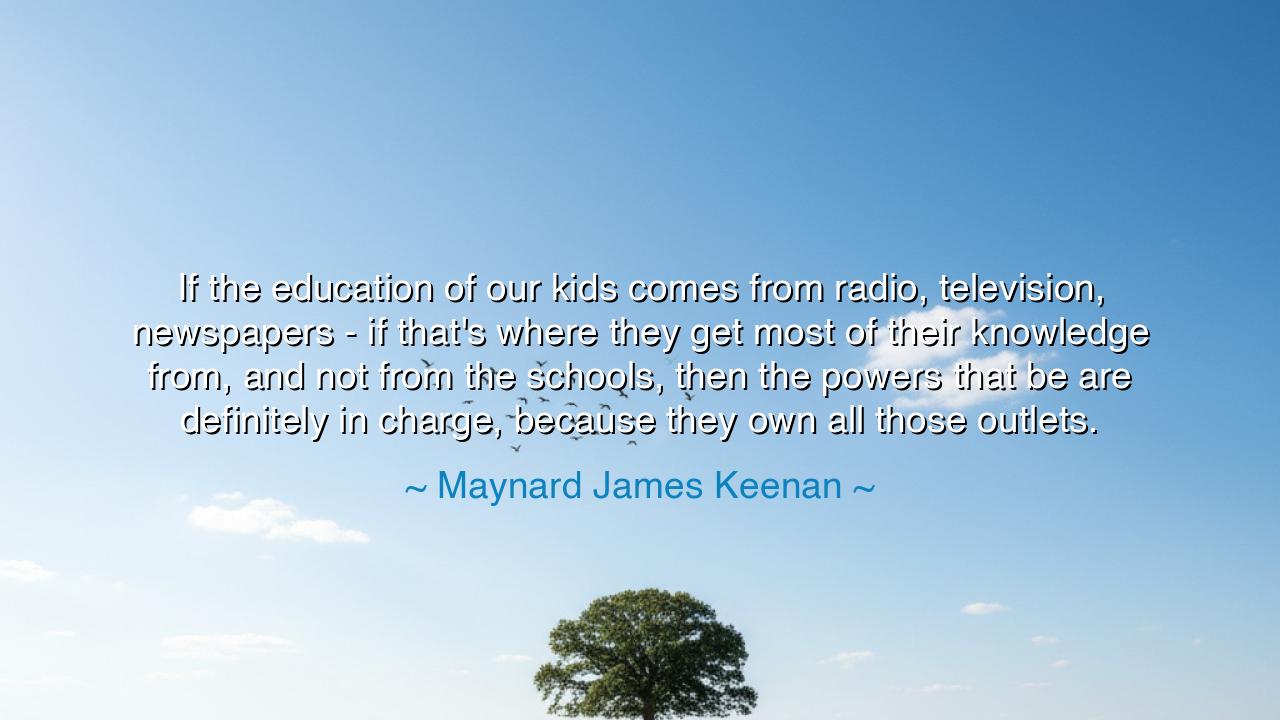
If the education of our kids comes from radio, television
If the education of our kids comes from radio, television, newspapers - if that's where they get most of their knowledge from, and not from the schools, then the powers that be are definitely in charge, because they own all those outlets.






“If the education of our kids comes from radio, television, newspapers – if that's where they get most of their knowledge from, and not from the schools, then the powers that be are definitely in charge, because they own all those outlets.” Thus declared Maynard James Keenan, poet and prophet of modern music, whose words echo like a warning bell in the darkness. In this saying, he exposes a danger older than kings and fresher than today’s screens: that when the young draw their knowledge not from the deep well of true education, but from the crafted illusions of media, they become subjects not of truth, but of those who control the narrative.
The meaning is clear: radio, television, newspapers—and in our time, the endless flood of the internet—are not neutral streams. They are owned, shaped, and directed by men and women with power, influence, and profit as their guides. When children learn more from these than from schools, their thoughts are no longer free. Their minds are molded by unseen hands, their desires manufactured, their beliefs steered toward the interests of others. What Keenan warns is not only the loss of education, but the loss of independence itself. For whoever owns the stories owns the people.
The ancients understood this peril. In the days of the Roman Empire, bread and circuses were given to the people, not as gifts, but as chains. Gladiators bled in the arena while citizens cheered, distracted from their own oppression. The games were their “television,” the speeches of emperors their “news,” and the minds of the masses were lulled into submission. True education, the kind that questions, resists, and thinks, was reserved for the few. Thus Rome’s rulers held power not only through armies, but through control of perception.
History repeats itself in every age. Consider Nazi Germany, where schools and media alike were bound by propaganda. Children learned not to question but to obey, not to think freely but to chant slogans. The newspapers and radios echoed one voice, until millions believed lies as though they were truth. This was precisely the danger Keenan warns of: when knowledge flows only from controlled sources, the powers that be are indeed in charge, and freedom is but an illusion.
Yet Keenan also implies the solution. If schools are alive, if they teach not only facts but the art of thinking, then the young will not be deceived. True education gives the tools to discern truth from lie, wisdom from noise. A child taught to think critically will not be a puppet of headlines or the captive of screens. He or she will weigh, examine, and question—and in this questioning lies freedom. For while the media may entertain, only education can liberate.
What lesson must we take from this? Parents, guard the minds of your children. Do not leave their souls at the mercy of flashing screens and crafted voices. Teachers, remember that your task is not only to fill heads with facts, but to awaken the power of thought. Citizens, do not swallow every tale from newspaper or broadcast, but weigh each one as a judge weighs testimony. Ask: Who owns this voice? What do they seek to gain? For in such vigilance lies the safeguard of liberty.
So let Keenan’s words ring in your hearts: “If education comes from media, then the powers that be are in charge.” Do not let your children—or yourselves—become prisoners of narrative. Seek truth from deeper wells, from books, from teachers, from dialogue, from the hard labor of reflection. For in the end, the mind that thinks freely cannot be owned. And that, above all, is the true purpose of education—to raise souls that no power, no outlet, no empire can command.






AAdministratorAdministrator
Welcome, honored guests. Please leave a comment, we will respond soon